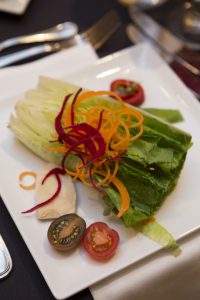Who doesn’t enjoy a fresh, crisp bowl of salad? Lettuce happens to be a vegetable that is easily grown in Florida for fall & winter gardens. In Florida, four types of lettuce are commonly grown: crisphead, butterhead, leaf, & today’s topic, romaine.
An interesting, little known fact about romaine lettuce is that it was cultivated extensively by the Roman Empire. By the fourteenth century, the Catholic Hierarchy had moved from Rome to Avignon, France bringing their prized lettuce along with them. During this period, the plant was known as “Avignon” lettuce. In England, romaine is called “cos” lettuce named after the Greek islands from which the lettuce was originally distributed. Of course, in the U.S., the name we give, Romaine, refers to the time when it was grown extensively in the Roman Empire.
Romaine is grown both commercially and in backyard gardens across the state. Like all lettuce, this is a cool season vegetable. September through March is a generally the extent of the growing season. Romaine can be grown from seeds or by transplants. If you are going the seeding route, just remember these seeds are very small and should be sown shallow and in a tight pattern, with 12”-18” row spacing and a light sprinkle of soil over the top. Newly planted seeds may require burlap or straw to help retain soil moisture for successful germination. Once plants reach a few inches in height, rows can be thinned to where plants are 8” apart.
Romaine needs adequate soil moisture throughout the season. Mulching around plants to retain moisture and adding a complete fertilizer such as 8-8-8 will help ensure a good yield. Lettuce is vulnerable to the usual suspects of garden pests. However, gardening in cooler months helps combat that threat.
Romaine lettuce is fun and rewarding to harvest, as well. You can pick a few leaves off a plant or harvest the entire head.
For more information, contact your local UF/IFAS County Extension office.
Supporting information for this article can be found in the UF/IFAS EDIS publication, “Romaine – Lactuca sativa L.” by James M. Stephens, Emeritus Extension Vegetable Crops Specialist, UF/IFAS: https://edis.ifas.ufl.edu/mv125
UF/IFAS Extension is an Equal Opportunity Institution.
- The Sunshine State is the Perfect Place for Sunflowers - July 20, 2025
- Why Are Sand Dunes & Sea Oats So Important? - March 20, 2025
- How to Care for a Gift Plant - December 5, 2024

